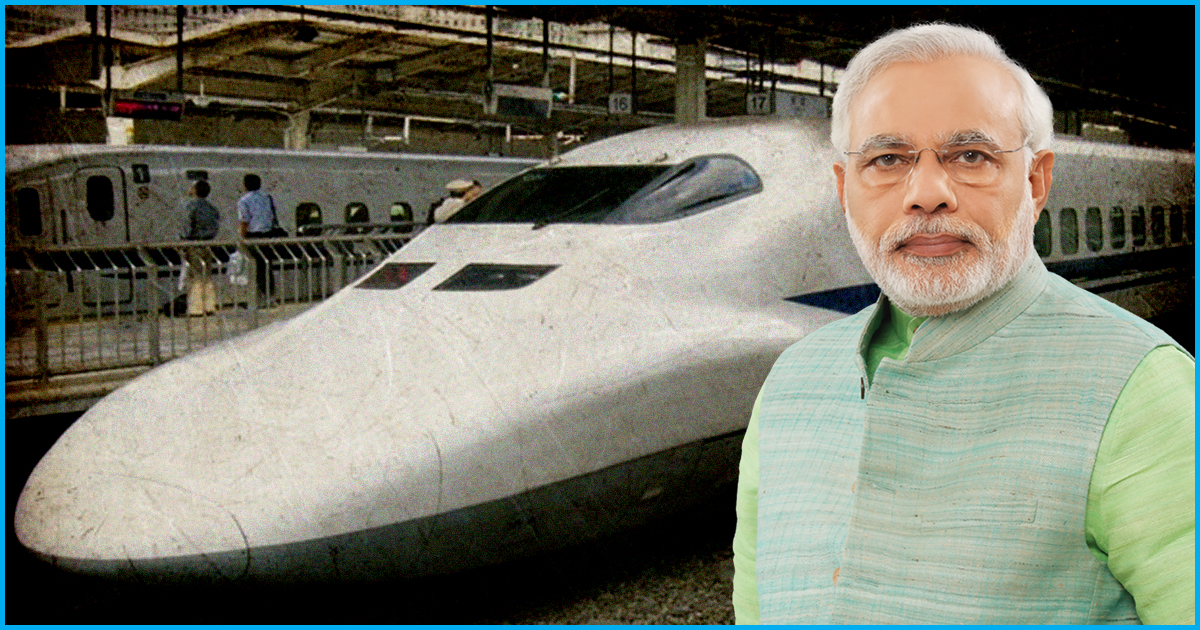India’s highly ambitious bullet train project is extremely unlikely to be finished and launched by the stipulated year of completion, 2022. Railway officials are trying hard to at least open a section if not the entire 508-km stretch between Mumbai and Ahmedabad. The National High-Speed Rail Corporation Limited (NHSRCL), which is in charge of the project has been facing a crisis of funds as well as land acquisition issues over the last few months. The project is facing stiff opposition and protests from farmers that are discouraging the farmland to be acquired.
The Wire reported that the Indian Railways after taking a note of the implementation challenges as well as delays is working to ensure that a stretch between Surat and Bilmora will be operational by 2022. Last year, when the deal was launched between India and Japan, the target for completion of the given stretch was set at 2023. However, Prime Minister Narendra Modi stressed his faith in the railways and the engineering sector to advance the launch date to a year earlier. Reportedly, work is going on round the clock to meet the entire target.
Might face a cash crunch
Reportedly, the pilot project has an estimated cost of Rs 1,06,000 crore which will be majorly funded by the Japan International Cooperation Agency (JICA). About 20% costs will be borne by the Ministry of Railways and the governments of Maharashtra and Gujarat. Out of the Rs 86000 crore that JICA has to pay under the project, Rs.5500 crores have been disbursed to India. Meanwhile, the Railways and the state governments have not contributed any money so far.
A limited international tender will soon be floated by the Indian Railways which is worth Rs 8,000 crore next month for the procurement of 24 bullet trains for the Mumbai-Ahmedabad high-speed rail corridor. As per the agreement with Japan, only Japanese companies will be allowed to participate in the tender. Among others, two leading Japanese manufacturers – Kawasaki and Hitachi – are expected to join the race for India’s first bullet train project. Out of the 24 trains, 18 will be directly imported while six will be manufactured locally as a part of the Make in India project.
A spokesperson for NHSRCL said to The Print, “We are still in the tender floating process, and as and when we would need money, we shall spend it on our own and we’ll get it reimbursed later. In the first six months of next year, we’ll be able to finish all the tendering process. The work shall begin in full swing from July 2019.”
“So far, two tenders have been floated — one for the Vadodara institute, for which 30-40 per cent work has been already done, and another for the Sabarmati terminus, for which the tender has been awarded as well. This will take some time,” he added.
Land acquisition remains a challenge
Land acquisition remains another major roadblock for the project to begin smoothly. The total land required for the project is 1,400 hectares. However, only 0.9 hectares of land has been acquired so far, reported The Print. Moreover, farmers in different states have been posing as stiff opposition in the implementation of the project.
Meanwhile, two farmers from Palghar, Maharashtra have moved the Bombay High Court contesting the Maharashtra government’s power to acquire land for the construction of the Mumbai-Ahmedabad bullet train corridor. They have even challenged the constitutionality of the Right to Fair Compensation and Transparency in Land Acquisition, Rehabilitation and Resettlement (Maharashtra Amendment) Act, 2018. With all these troubles, the bullet train project seems a like long road ahead.
Speaking at The Economist India Summit 2018, Rail Minister Piyush Goyal dished some details on the process. He said, “Land acquisition procedure for the first bullet train project (Mumbai-Ahmedabad) will be over by December this year. We are taking more time because we engage landowners and hold dialogue for acquisition. We want to take them into confidence.” According to him, the delay caused by land acquisition may be compensated by the advancements in the Indian engineering sector. The work related to designing and assembling machines to build a 27 km under-sea tunnel as part of the project was already under progress.
Also Read: While Japan Denies Stopping Funding For Bullet Train, Farmers Say Their Consent Not Taken











